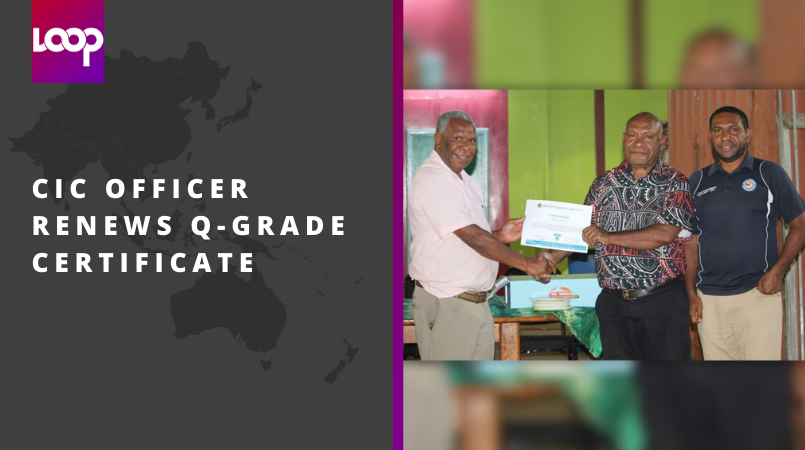
A staff engaged under the Coffee Industry Corporation’s PNG Agriculture Commercialization Diversification (PACD) project recently underwent overseas training in expanding knowledge and work requirements.
Quality Control Officer, Enos Dum was in Sydney, Australia to undergo various exams to meet the requirements of the Coffee Quality Institute (CQI) to pass and renew his Q-Grader license.
For many, understanding a good cup of coffee is that it just tastes good to the mouth when you drink it. However, for a trained person, who tastes the overall attributes of a good quality coffee. It is a skill that one has to master to pass arduous and stringent exams to qualify as a Q-Arabica Grader.
Q grader is a term associated with the specialty coffee industry. They examine coffees and score them based on their many attributes and overall quality. It is the only certification in the industry that is based on quality. The system quantifies taste attributes in a coffee cup such as acidity, body, flavour, aftertaste, uniformity, balance, sweetness, etc.
CIC-PACD Project Manager Potaisa Hombunaka said under CIC’s mandate to continue to maintain quality control systems to the highest standards, it has come on board to sponsor Enos with K26,000 to undergo the one-week training in Sydney, Australia.
Hombunaka said Q-Graders are professional cuppers who are highly trained whereby they have undertaken tests/exams offered under the CQI’s Q Grader education program. The course is tough and stringent to test the participant’s ability to skilfully pass all the exams. He said only two out of the 16 participants passed and were certified as Q Graders whilst the rest will reseat again next time.
“We are grateful that Enos has done extremely well as a young Papua New Guinean among 16 other participants from six other countries to successfully pass all the theory and practical exams to enable him to quality as a recognised Q-Grader from this prestigious institute,” Hombunaka said.
PACD will be sending another officer by the end of this year and two more next year. Hombunaka explains that there are several benefits a Q-Grader can bring to his or her work environment and the coffee industry.
These include:
- Giving confidence to the buyers and importers on the quality aspect of a contract when sighting documents, especially quality reports produced and signed by a valid Q Grader license holder. Anybody can produce quality report but a Q grader’s signature will have special consideration
- Permitted to use the CQI’s Q Grader logo. After being issued the Q Grader license, the holder is authorized to use the CQI’s copyright Q Grader logo on quality reports or other relevant documents produced by the holder, or business cards, email signatures and any e-communication where required. All in all, usage of logo is strictly advisable to comply with CQI’s logo usage guidelines.
- Forms an integral part of In-Country Partner program (ICP). For a producing country like PNG to be qualified for the ICP program, it has to have at least 3 active Q Graders. These are the people who will carry out independent assessments on all coffees coming through the ICP. Depending on the Q Graders’ reports, ICP will either Q certify the coffee into a specialty market or issue a technical report if the owner (farmer) needs to improve on quality.
Dum acknowledged the support of PACD through CIC to be able to undertake the exams in Australia to attain his Q-Grader certificate and above all to be able to assess quality coffee with recognition from the CQI.
CQI has extended Dum’s certificate to operate as an internationally recognised Q-Arabica Grader for the next 36 months from March 16th, 2024 to March 16th, 2027.
“This achievement is for CIC and PNG as a coffee producing country. It puts PNG on the global list of countries with highly skilled professional cuppers,” Dum said.
CIC Chief Operations Officer Steven Tumae said the training is the only internationally recognised certificate system for Arabica cuppers for specialty coffee by the CQI in the United States. Tumae acknowledged the timely support by PACD and congratulated Dum for this achievement.
